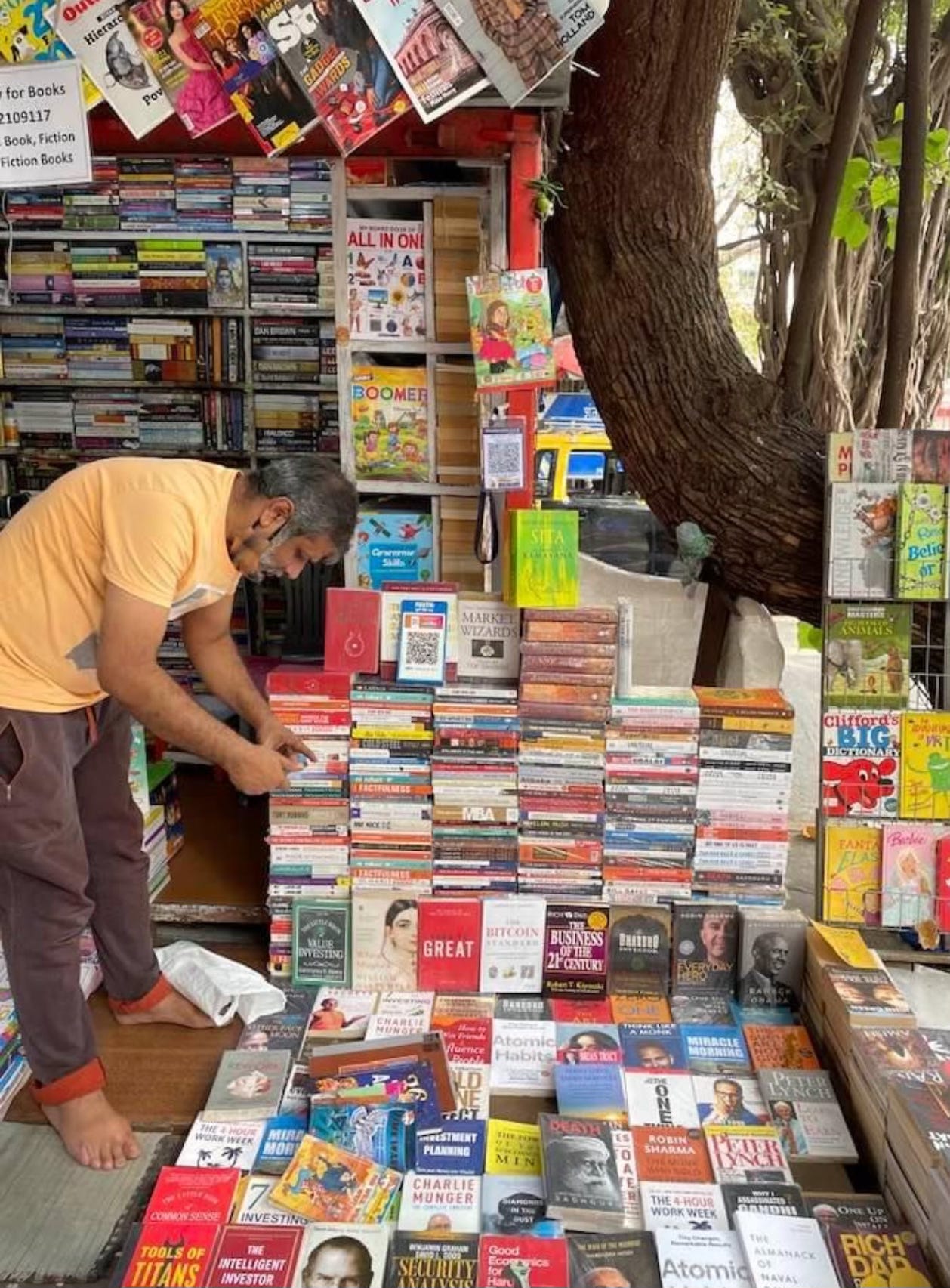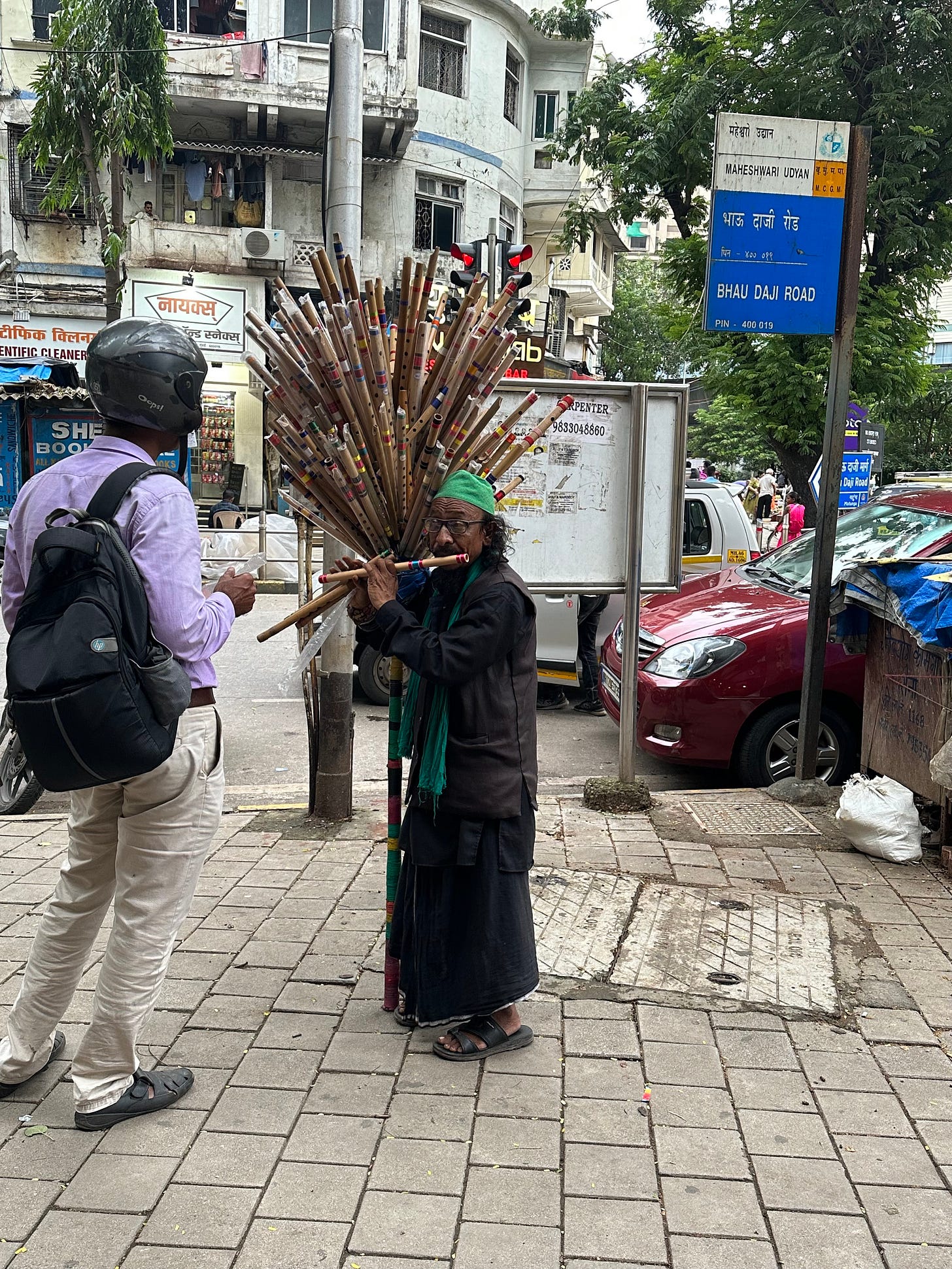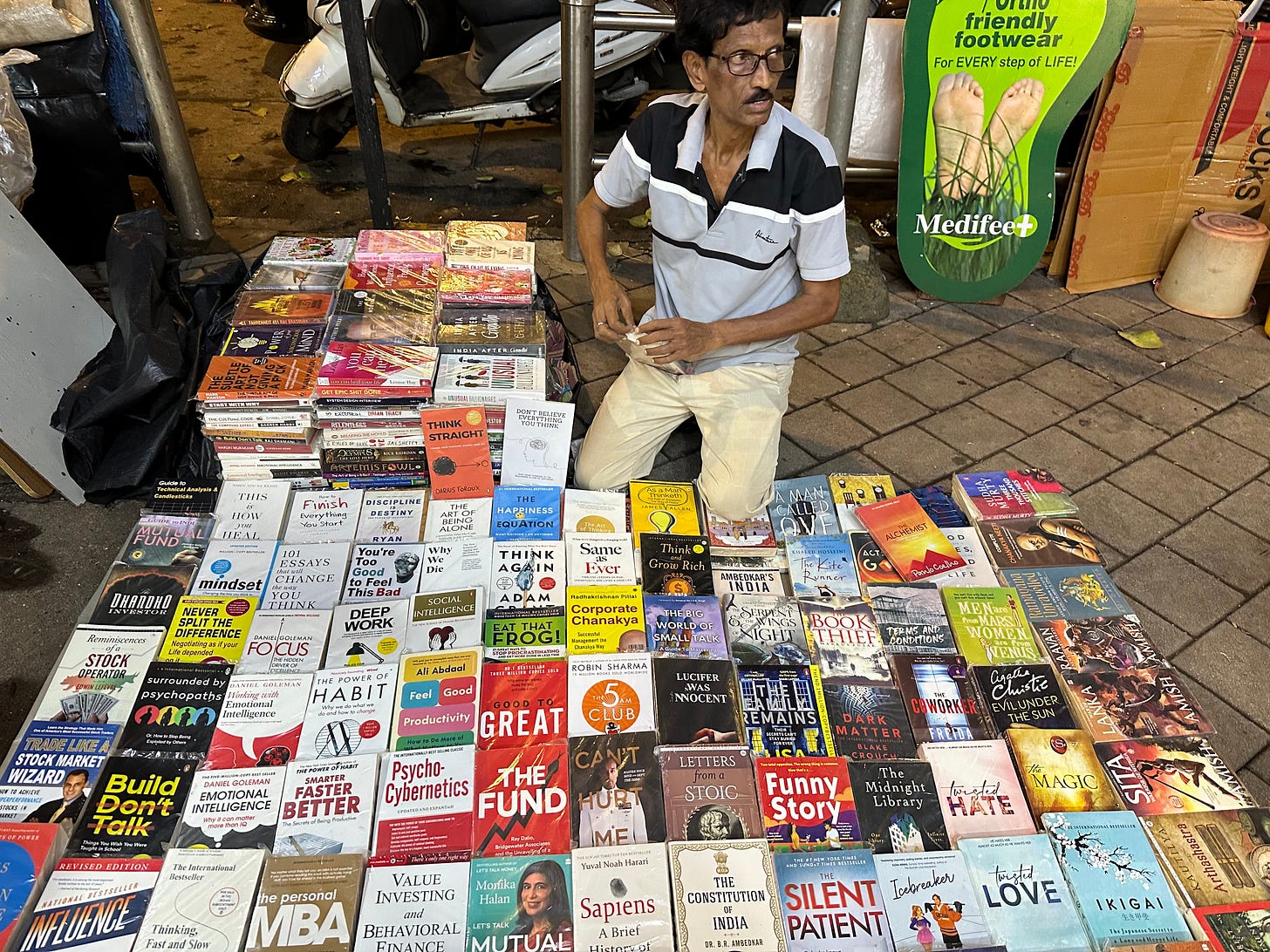A strange conversation ensued this evening on my way to buying a backpack in the crowded Matunga market area of central Mumbai. It interestingly blurred the lines between knowledge, practicality, and wisdom. The protagonist was the smart street bookseller of Mumbai.
As I darted across the monsoon-soaked road dodging the onslaught of the evening traffic interspersed with stray dogs, cats, and cows, I passed a street bookseller—of which there are plenty scattered across the uneven pavements of Mumbai. Many of us who grew up in this bustling city of 21 million people may even recall buying some of our college textbooks from street booksellers.
Invariably, I slowed my pace to furtively scan the book display on the dusty road, waiting for a title to jump out at me.
This bookseller, who has been around since my little girl days growing up in Mumbai, gives a new meaning to the expression, tree of knowledge! His display hugs a century old oak tree.
The bookseller, seeing me stare at his books as if in a trance, asked his customary, “Kya dikhao, madam?” Or “What can I show you, madam?”
I hurriedly brushed him off saying “Kuch nahi” or “Nothing”. I told him I was in a hurry but continued to look at the books neatly piled one next to the other, my backpack errand temporarily forgotten.
Then he said, “You could use some books on motivation.”
Hmmm…interesting, he was a psychologist in addition to bookseller.
Did I look that crestfallen? I was quite perked up actually meeting my high school buddies that afternoon. Maybe he knew something I didn’t.
Or he was trying to catch my attention—he did—to make a sale.
Mumbai is a rough and tough city of the survival of the fittest. Millions flock to the city from far corners of the country to make a living in the most creative ways.
This vendor for example, seems to make a living selling wooden flutes while appealing to musical sensibilities of citizens, playing them a catchy tune or two and hoping for a sale.
Our bookseller protagonist of this post in front of his ware.
Our book friend handed me a book titled, What Yko0ou are Looking For is in the Library by Michiko Aoyama. It’s a Japanese bestseller. Not a book on motivation per se but spot on in terms of my interests—libraries! Before my travels to India, I had picked up a novel that was set in a library in Paris.
How in the world did he know that I loved libraries? And that I could spend a lifetime in libraries or bookstores?
Then, he bent and picked up Paulo Coelho’s Maktub, giving it a good dusting with his right-hand fingers, and following it by a final thud on his arm before handing it to me, as if to awaken Coelho’s learning gems within the book. Then he said, “Yeh to aap ko pasand hi ayega. Aap Alchemist to padhe honge.” “You will definitely love this book. You’d have definitely read The Alchemist”.
How did he know that?
Maybe he took an educated guess. I was not that surprised actually—these street booksellers of Mumbai are an interesting breed. They are mostly uneducated in the traditional sense of the word but speak at ease about classics! Or well enough to sell their wares, namely books. It was just part and parcel of the street smartness required to exist and thrive in a city like Mumbai.
But it is impressive nevertheless and quite puzzling how the street booksellers picked up the content of timeless books! I mean, it requires a certain bent of mind to master what’s within the cover of a book and it surely does not come easy to someone who arguably can’t read!
A few days back, I was browsing another vendor’s display and he asked, “Kiske liye madam?” “For whom, madam?” And I said, “For my 14-year-old”. He dusted off Kite Runner by Hosseini and Jane Eyre by Brontë and handed them to me, explaining that all kids should read these. I said my boy had already read them. To which he said, that’s great.
I felt like I was talking to a school academic advisor, not a street vendor.
Then he gave me a compilation of bios of great business visionaries and said that young boys would enjoy it. He explained he had one on Mumbai’s favorite billionaires, the Ambanis, but that bio was taken off the shelf for political reasons. These street booksellers were in touch with literary controversies too!
He added and I translate into English, “I have Crime and Punishment but that’s a bit much for a teen.” The man was dressed shoddily, but he seemed much at ease talking about Dostoevsky and the Brontë sisters as if he were a literary scholar.
Back to the Coelho seller, I asked him how he knew so much about these books. He said, “Thirty years ka experience hai, madam!” “I have 30 years of experience.” I told him his comrade from a few feet away was talking about Crime and Punishment and how it was not appropriate for a teen, and he said, of course, why would you give Dostoevsky to a 14-year old? “Bahut jaldi hai, madam.” “A bit too early, madam”.
“But how do you know what’s inside the book?” I asked. “Do you read them?”
“Nahi nahi madam, hum kaha padde likhe hain, sirf experience hain books mein.” “No, no, madam, I am not educated, I am just experienced with books.”
Interesting, I thought, I see them as one and the same thing—educated and experienced with books! In fact, his brand of bookish experience is more practical—he seemed knowledgeable about books and smart enough to sell them based on his knowledge. That’s practical wisdom.
So, what would that make of our Coelho friend? An uneducated bookseller? A street-smart bookseller? A sharp businessman? A practically wise man for being more informed than the average Joe about what’s within timeless books? I am not one for labels, but it certainly stretched my typecasting of the world a bit…
While you decide, the one other prevalent thought I had was—with his pulse on what books work, who reads them, and his own take on books, our street bookseller friend might just have the most insightful comments from among us all, on our Substack posts!
Meaningfully yours,
Anu Prabhala








Very nice piece of writing. Cities like Mumbai are inexhaustible in terms of the characters that inhabit them. In line with the topic of this post, you might like Pierre Bayard's "How to talk about books you haven't read." It delighted me with its wisdom and humour.
I think my message to your post was sent incomplete
However what I wanted to say was, “beautiful writing “